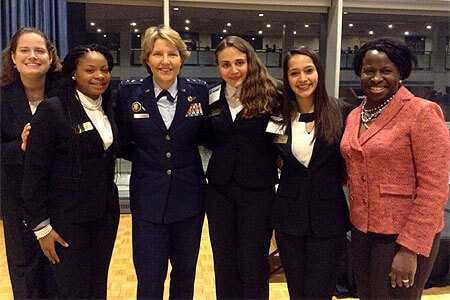One wore jeans and a T-shirt. One wore workout sweats. One wore hoop earrings.
The three young women laugh at the memory – the recollection of their various wardrobe and accessory choices on the day they first met with the NIU educator who eventually would change their lives – and shake their heads at just how high they’ve risen.
Shanell Walter, 23, was only 17 when she became a mother to Shylah, who’s about to turn 6. Karina Avila and Maria Colompos are the daughters of parents for whom English is a second, or even third or fourth, language.
 But with only a few months until their graduation from NIU, these three are not merely students with big dreams for the future but published authors, well-traveled conference presenters and poised professionals with the kinds of Rolodexes and letters of recommendation that are the envy of their peers.
But with only a few months until their graduation from NIU, these three are not merely students with big dreams for the future but published authors, well-traveled conference presenters and poised professionals with the kinds of Rolodexes and letters of recommendation that are the envy of their peers.
Active-duty military leadership positions await them all, followed by more education toward master’s and doctoral degrees and, finally, careers in courtrooms, health care and law enforcement.
And, in 40 years or so, thanks to the mentoring they’ve received at NIU, they confidently plan to retire as millionaires.
“It’s been a humbling experience,” says Avila, who at 21 is the youngest of the group. “When this process started, I didn’t picture that we’d get this far.”
“We didn’t realize how great this was going to become,” agrees Colompos, 22, who wears a metal nametag that brands her an NIU Scholar. “It’s empowering to have someone who actually cares about you, believes in you and cares about your social capital.”
“She’s our role model. We look up to her,” adds Walter, who grew up in the Roseland neighborhood of Chicago and came to NIU through the CHANCE Program. “It’s been an amazing journey.”
La Vonne I. Neal, associate vice president for administration and finance at NIU and former dean of the College of Education, is that “someone” – that “she.”
Neal, a veteran of the U.S. Army, first became their inspiration during her keynote address at the NIU ROTC Military Ball in the spring of 2013. A few days later, when the young cadets heard that Neal was looking for students to mentor, they could not raise their hands quickly, or high, enough.
“I extended an invitation to mentor any female who wanted to be mentored,” Neal says. “These three showed up.”
Think that “showing up” is half the battle or more? Think again. Neal’s blueprint for the next three years was towering.
Avila, Colompos and Walter would learn how to handle themselves as mature, productive adults. They would learn how to lead – and how to inspire. They would learn about, and conduct, research. They would present their work at academic conferences. They would write journal articles. They would write a book.
Meanwhile, they were expected to achieve and maintain levels of excellence in their academic studies – Colompos has earned a 3.9 GPA with a double major, a double minor and four certificates, while Walter is president of the Mortar Board Senior Honor Society – along with honoring and excelling in their ROTC commitments.
All have endured and progressed through the ROTC ranks from cadet private to leadership roles; Avila is the battalion commander – the first female, and the first Latina, to hold that top position.
“No one rises to lowered expectations,” Neal says. “They have taken on every challenge, and have engaged this process with elegance and grace. When we collaborate, our scholars graduate.”
“This process has been extremely important to me,” Avila confirms. “My grades were not where they are now. This has kept me on track. It’s kept me focused.”
‘Different is not deficit’
During her keynote address to the ROTC cadets, Neal retraced her own steps to career success while emphasizing that “different is not deficit” – words that struck a chord with the three young women with distinct backgrounds and circumstances.
In personal narratives written by Avila, Colompos and Walter for their book, “Borders, Bras, and Battles: A Practical Guide to Mentor Undergraduate Women to Achieve Career Success,” they explain what drew them to the priceless opportunity that everyone else dismissed.

Lt. Gen. Michelle D. Johnson (third from left), superintendent of the United States Air Force Academy, joins (from left) Sarah Militz-Frielink, Shanell Walter, Maria Colompos, Karina Avila and retired Col. Gail B. Colvin
at the 2015 National Character and Leadership Symposium.
“I am the proud daughter of parents who migrated to the U.S. from Mexico. My first year in college was difficult to navigate because I am a first-generation college student,” wrote Avila, who wants to make her parents and younger sister proud. “Dr. Neal helped me understand that danger is real and fear is a choice. She believed in me, and that was enough to get me back on track academically without fear.”
Colompos, from Chicago, glimpsed a kindred spirit who “could potentially help me truly find my purpose in life.”
“I was captivated by her confidence. She had a powerful voice, and I immediately realized that she was the acculturated mother figure that I needed,” Colompos wrote. “Her voice reminded me of my grandmother because of how genuinely she expressed her visions of the importance of making a difference.”
For Walter, who’d grown up wishing she could meet Rosa Parks, Harriet Tubman, Corretta Scott King and others, Neal’s speech put her “in the presence of an African-American women of such greatness.”
“She looked like me. Her skin color was as deep and brown as mine,” Walter wrote. “She mirrored the image of the African-American women you read about, or heard about in history lectures – the Black women you have always dreamed of meeting because they were rare to come across, the women who made a huge difference for the next generations to come.”

Daryl Michael Scott, president of the Association for the Study of African American Life and History, joins (from left) Shanell Walter, Maria Colompos, Sarah Militz-Frielink and Karina Avila in September of 2014
at the 99th annual ASALH Convention in Memphis.
Differences already have been made within Avila, Colompos and Walter, and those lessons extend far beyond traditional academics.
How to dress for success. How to save money. How to impress at formal dinners through proper etiquette. How to write the date and place of meeting a new professional contact on the back of that person’s business card. How to open a bank account. How to buy – and even how to decorate – a home. How to cook food that’s been prepared healthily. How to file income taxes. How to acquire insurance from USAA, which specializes in serving members and veterans of the armed forces and their families.
Their journey also came with reminders that they were powerful, they were beautiful and that there was strength in remaining connected to their cultural identity.
“Of all of the things she taught us – how to be a better leader, the research process – the most rewarding part, what has made it important, is the person you become from it,” Walter said. “I can’t believe how much we’ve grown by believing in ourselves.”
‘You can do it’
Neal and Sarah Militz-Frielink, a doctoral candidate in the curriculum studies program at the University of Illinois at Chicago, planted the seeds of “Borders, Bras and Battles.”
Alicia L. Moore, a member of the U.S. Army Command and General Staff College Advisory Board, also contributed to the design of the study that includes not only introspective self-looks at Avila, Colompos and Walter but examinations of external factors that impact the lives of people who are culturally, linguistically and ethnically diverse.
 In a journal article the trio wrote for the Fall 2015 edition of the Black History Bulletin, they illuminate the need to better understand the sociocultural perspectives of female scholars of color in ROTC: “They are important, yet often ignored, parts of the conversation on social justice movements in the military.”
In a journal article the trio wrote for the Fall 2015 edition of the Black History Bulletin, they illuminate the need to better understand the sociocultural perspectives of female scholars of color in ROTC: “They are important, yet often ignored, parts of the conversation on social justice movements in the military.”
“This is a women’s story,” Neal says. “This is a legacy-of-leadership story.”
Beyond the personal narratives, Walter researched how policies and standards might impact people of color. Avila explored gender disparity in the military, including pay and combat roles.
Colompos, who grew up hearing mostly Greek or Spanish spoken at home in addition to French, German and sometimes English, focused on polices that impact military members who speak different languages.
The research and writing was only the start, of course.
Since completing their work, they’ve presented their “Borders, Bras and Battles” scholarship at the 2014 convention of the Association for the Study of African American Life and History in Memphis, where the other presenters were faculty or doctoral students.
Repeat performances came during the 2015 national conference of the Association of Black Women in Higher Education, the 2015 National Leadership and Character Symposium of the United States Air Force Academy in Colorado Springs, Colo., and the 2015 Undergraduate Artistry and Research Day at NIU.
Last fall’s article in the Black History Bulletin foreshadows the book, which Apprentice House just published this spring.
“It’s a good guidebook to put in your back pocket for life,” Walter says. “You can read, reflect and put these actions into place to become that person you want to be.”
“This book is to be a stepping stone for others to follow. The biggest message is, ‘You can do it,’ ” adds Colompos, one of the U.S. Army’s 1,115 Distinguished Military Graduates for 2016, an honor bestowed on the top 20 percent of the 5,575 seniors on the order-of-merit list.
“I’ve been told a lot of times, ‘No, no, you can’t do it. You’re not smart enough to go to school.’ But now we’re here, and there’s going to be a book,” she adds. “All of this has been telling me to challenge the system, to challenge the pressures. You really want to challenge everything you’re faced with.”
The next chapter
 Lt. Col. Jay Morrison, professor and chair of the NIU Department of Military Science, regards the project undertaken by his three battalion leaders as “a vehicle to show their true potential.”
Lt. Col. Jay Morrison, professor and chair of the NIU Department of Military Science, regards the project undertaken by his three battalion leaders as “a vehicle to show their true potential.”
“Regardless of their rank or position, they always seem to step up for the greater good and to greater success,” he says. “I’d like to believe that’s from what we’ve instilled in them, but by no stretch of the imagination do I believe that it didn’t come from their project.”
With all three selected for active duty – an honor Morrison says is achieved by as few as 40 percent of ROTC cadets – their future is bright. Simply making it through all four years of ROTC demonstrates “their true mettle,” he adds: About 80 percent of students who begin the program fail to complete it.
And whether their military careers last only four years or encompass three decades, the lieutenant colonel says the women all will grow, struggle, sometimes fail and ultimately succeed.
“I can see in each one of these ladies – and I don’t say this lightly, and I don’t mince words – incredible potential to excel as leaders in our nation’s military,” Morrison says. “They’ve been competing against themselves, against their own development, and our program is not one where they’ve benefitted or advanced themselves by stepping on one another. One of the biggest leadership traits we look for is teamwork.”
Vernese Edghill-Walden, senior associate vice president for Academic Diversity and chief diversity officer at NIU, sees the cadets as “one of many examples of success NIU students of color who work hard, get engaged in the campus and local community and find a NIU faculty and staff mentor to help shape their personal and professional growth.”
“These young women have a great work ethic, drive and passion for their work and desire to make a difference in the world,” Edghill-Walden says.
“As a woman of color, I know how difficult it can be to find a mentor that can be a coach and a teacher who holds you to a high standard, and a model of excellence that empowers you to be great. These women found that in Dr. Neal, and they are ready to soar,” she adds. “Their individual and collective stories of success are powerful and can help to empower other young women, especially at NIU. They are prepared to positively impact their family, local community and the nation.”
 No one in the trio underestimates the value of this experience.
No one in the trio underestimates the value of this experience.
Avila, who is eager to launch her Army career as a second lieutenant, assume command of her first platoon and begin mentoring her soldiers as she has been mentored, likes the example that she’s setting for her 11-year-old sister, Briana: Pursue your dreams.
“I’ve always wanted to enlist in the Army, but my mom wouldn’t let me. I found another route. I found ROTC,” says Avila, who grew up in Mendota, Ill. “My mom’s gotten used to the idea now. She knows she can’t hold me back at this point.”
Younger ROTC cadets are drawing similar inspiration, she adds.
“They’re saying, ‘I’m going to be like them. I want to get to where they are,’ ” says Avila, a newlywed whose husband, Alex, is also an Army officer.
Colompos, who eventually plans to earn a law degree as well a Ph.D. in psychology and join the behavioral unit of the FBI, sees the impact of her changed life reflected in the eyes of her 4-year-old godson, Adrian.
“He says, ‘Oh, I’m going to be in the Army, too,’ ” she says.
Walter also is bound for law school, followed by a career in the U.S. Judge Advocate General’s Corps. She’s simultaneously making plans to travel as a motivational speaker, telling the story of her time at NIU and the wings she found here.
“This is God’s plan for me,” she says, “and my daughter’s been able to see my journey, through high school – ‘OK, Mommy made it’ – and through college: ‘OK, Mommy made it.’ I keep telling her, ‘Mommy’s doing this for you.’ ”



